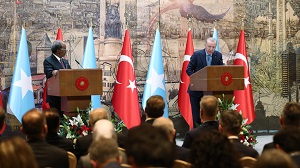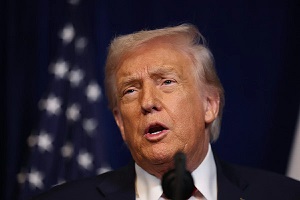How do you solve a problem like Jerusalem? - By Dr. Azeem Ibrahim, Al Arabiya
Arabs now believe that the charade of the US being an honest broker in the stalled, non-existent peace process has finally been put to rest with Trump’s announcement of moving the US embassy to Jerusalem. The US had after all only offered feeble protestations at the ever expanding Israeli settlements which changed the facts on the ground while the Palestinians watched in horror as their future state diminished.
Trump’s decision puts him at odds with all his international allies. And even though he announced his decision with great fanfare, it does not necessarily mean it will come to pass. After all the process of moving a large US embassy is a serious undertaking and will take at a minimum six years according to the State Department. Trump may have vacated the oval office well in advance of that and the decision easily reversed by his successor who can then use it a threat to the Israelis and olive branch to Palestinians pressuring them to come round the table and negotiate.
But any such negotiation towards the two-state solution would ultimately still lead back to this biggest challenge: the status of Jerusalem. So assuming the embassy move does not happen, how do you deal with the problem of Jerusalem?
At first, the disagreements seem insuperable. The claims seem mutually exclusive and the emotions too deep. Jerusalem - Al Quds - is the third most important Muslim city, it is the capital for which Palestinians yearn, and East Jerusalem is the capital of Palestine according to a law passed in 2000 by the Palestinian Authority. Millions of Muslims have prayed at the Al Aqsa Mosque and the Haram al Sharif at the Dome of the Rock. At the same time, it is the holiest city for Jews, has been designated the complete and united official capital of Israel in an Israeli law of 1980, and millions of Jews pray at the Wailing Wall, right next to the Dome of the Rock.
Netanyahu has openly voiced the longstanding Israeli opinion that "[a] united Jerusalem is Israel's capital. Jerusalem was always ours and will always be ours. It will never again be partitioned and divided." The Palestinians responded that "by saying [that Jerusalem can never be divided], he's saying the state of conflict will be eternal."
But I believe that this is a problem that can be solved. There is more flexibility under the surface than it first appears.
A unified Jerusalem authority
Firstly, the underlying trend of Israeli public opinion is moving towards compromise. In 1973, an opinion poll showed that only 1% of Israelis wanted to let the Palestinians have sovereignty over East Jerusalem. By 1997, 45% were willing to consider Palestinian sovereignty over the periphery of the city. Subsequent polls showed up to 54% willing to accept a Palestinian capital and control over the Islamic Holy Places on the Temple Mount itself, right in the middle of the Old City of Jerusalem.
Secondly, demographic trends argue for compromise. The post-1967 Israeli policy of trying to ensure that Jerusalem was predominantly Jewish has not worked; the Jewish majority is declining and is set to continue towards parity in the coming decades.
Thirdly, the reality of sharing Jerusalem would not be as big a change as many Israelis think. Palestinians who live in East Jerusalem currently vote in Palestinian elections, pray in Mosques controlled by the Palestinian Authority (PA), read PA-controlled newspapers, pay taxes to the PA, are policed by the PA, use electricity from a company which only serves Palestinian cities, and study at PA-run schools and a university - Al Quds University - certified by the Palestinian Ministry of Higher Education.
Fourthly, there have been numerous unofficial agreements between Palestinian and Israeli representatives on how to share Jerusalem, which have cumulatively chipped away at the Israeli idea that Jerusalem will never be shared. These offer a good starting point for a new plan.
The solution will have to form part of eventual final status negotiations. But it seems to me that the best solution is a federal system of boroughs similar to the states of the US, and a unified Jerusalem authority, similar to the US federal government.
The borders of the municipality of Jerusalem would include everything that it does now and also nearby Palestinian cities such as Abu Dis. Some boroughs would naturally be majority Palestinian, others naturally majority Jewish, but free and fair borough elections would ensure proportionate representation on each.
The unified Jerusalem authority would comprise representatives from the boroughs, the Israeli and Palestinian governments, and all major religious authorities in the old city. It alone would be responsible for maintaining the Old City and all holy places, with a police force comprised of Palestinians and Israelis. It would be constitutionally bound according to the principles laid out in the unofficial 1995 agreement between now Palestinian president Mahmoud Abbas and the then Israeli deputy foreign minister, that Jerusalem must remain 'an open and undivided city with free and unimpeded access for people of all faiths and nationalities'.
Traditionally, the main sticking point has been sovereignty; which parts would become 'Palestinian' and which parts 'Israeli' sovereign territory. But on closer inspection, this boils down to the question of whose troops defend Jerusalem if it is attacked. This would have to be addressed as part of the final status negotiations. But the reality is that Jerusalem is not going to be attacked by conventional forces any time soon. More pressing is the question of 'functional sovereignty' - the question of who runs the city and ensures day-to-day security.
If the two sides ever come to discuss this again, my answer to the problem would be: it is time for 'functional sovereignty' to be assumed by the city of Jerusalem itself.
Latest News
-
 Turkey calls 'Israel's' recognition of Somaliland 'illegitimate'
Turkey calls 'Israel's' recognition of Somaliland 'illegitimate'
-
 Trump warns Hamas, Iran after Netanyahu talks
Trump warns Hamas, Iran after Netanyahu talks
-
 UAE denies Saudi accusation of fuelling Yemen conflict
UAE denies Saudi accusation of fuelling Yemen conflict
-
 Syria reveals new post-Assad banknotes
Syria reveals new post-Assad banknotes
-
 Hamas Armed Wing Refuses to Surrender Weapons, Confirms Spokesman Killed by Israel in August
Hamas Armed Wing Refuses to Surrender Weapons, Confirms Spokesman Killed by Israel in August